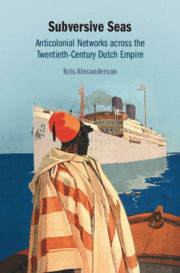Book contents
- Subversive Seas
- Subversive Seas
- Copyright page
- Contents
- Figures
- Tables
- Acknowledgments
- Abbreviations
- Maps
- Introduction
- Part I At Sea
- 1 Kongsi Tiga
- 2 Java-China-Japan Lijn
- 3 The Dutch Mails
- Part II In Port
- Conclusion
- Appendix: Testimony from Communist Informant Kamu, 26 January 1928
- Select Bibliography
- Index
3 - The Dutch Mails
Passenger Liners as Colonial Classrooms
from Part I - At Sea
Published online by Cambridge University Press: 12 April 2019
- Subversive Seas
- Subversive Seas
- Copyright page
- Contents
- Figures
- Tables
- Acknowledgments
- Abbreviations
- Maps
- Introduction
- Part I At Sea
- 1 Kongsi Tiga
- 2 Java-China-Japan Lijn
- 3 The Dutch Mails
- Part II In Port
- Conclusion
- Appendix: Testimony from Communist Informant Kamu, 26 January 1928
- Select Bibliography
- Index
Summary
- Type
- Chapter
- Information
- Subversive SeasAnticolonial Networks across the Twentieth-Century Dutch Empire, pp. 99 - 134Publisher: Cambridge University PressPrint publication year: 2019



